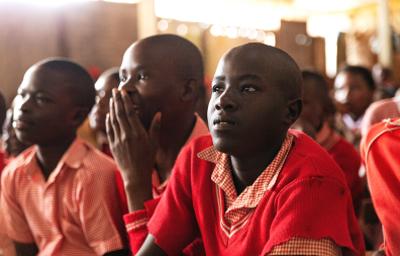OU research leads on £2.2 million project to decolonise peace-building in Africa

An OU academic, Parvati Raghuram, Professor of Geography and Migration, Faculty of Arts and Social Sciences at The Open University, has recently been awarded £2.2 million to lead the Arts & Humanities Research Council network plus project: Decolonising peace education in Africa.
The project involves co-investigators from Coventry, Durham and Lancaster Universities (UK), Makerere (Uganda), Midlands State University (Zimbabwe), University of Abuja (Nigeria) and University of South Africa (South Africa) and the NGO, Pan African Development Education and Advocacy Programme.
Sharing peace through the arts
The project, which will run until March 2024, will consider how the arts and creative practices can be used to explore and utilise local meanings of peace and will embed these in locally meaningful, coproduced curriculum offered both across the global South and North.
Professor Raghuram said: “The pedagogies and curricula that underpin peace education are grounded in Eurocentric and liberal values, much like the wider peacebuilding project. These have contributed to the failure of peace building initiatives in Africa, a continent where many societies have been affected by decades of violence and war. This project aims to improve knowledge about how to use local meanings of peace in peace education initiatives, locally and globally.”
Understanding what peace means for marginalised African communities
The project will, for the first time, draw on Arts and Humanities methodologies to explore existing values and knowledges that underpin peace amongst displaced and marginalised communities in many countries in Africa. Teaching materials will be developed and delivered through 14 weeks of teaching to young people aged 16-35, who have had interrupted study due to conflict. The values and knowledges around peace will be embedded in locally desired teaching materials ensuring that the teaching is meaningful. It will be evaluated by teachers and students. These activities will be undertaken in Nigeria, South Africa, Uganda and Zimbabwe as part of phase one of the project.
Embedding the findings in training and policy
In phase two, 15 further projects will be commissioned to enhance and expand these initial findings and the outcomes will be made available in a peace education framework, three Open Educational Resources and will be embedded in Higher Education Institute’s teacher training with an initial reach of a minimum of 12,000 trainees per year in phase one and a further 8,000 thereafter. Training will also be offered to community-based organisations providing informal learning to ensure that we offer the benefits of the project to those who are vulnerable but hard to reach. The project seeks to embed these learnings in education policy (as in Zimbabwe) where it will ensure long-term legacy of the key findings.
Professor Raghuram said: “The project addresses the question: What are the different knowledges and values underpinning peace and how can these practices be connected and compared across countries to create curriculum content and mode of delivery in informal and formal, secondary and Higher Education, in order to decolonise peace education? This networking project aims to bring together academics, NGOs and disadvantaged communities in Africa to offer new meaningful knowledges, pedagogies and teaching materials for a decolonised peace education.”
Building on the OU’s learning pedagogies
The OU, as lead organisation for this project, extends the pedagogic potential of distance learning pedagogies pioneered at the University. It particularly draws on the OU’s learning design model that has been adapted and rolled out across several African countries in a previous Economic and Social Research Council funded project International Distance Education and African Students.
Contact our news team
For all out of hours enquiries, please telephone +44 (0)7901 515891
Contact detailsNews & articles

OU researchers lead international advances in planetary protection
Open University researchers are leading international advances in planetary protection, helping ensure that space exploration is safe, sustainable, and scientifically rigorous.